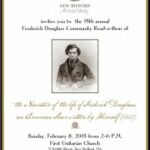Cape Verdeans Recount Ancestor’s Journey to the U.S.
With grateful hearts, Cape Verdeans recount ancestors’ journey to U.S.
By SIMÓN RIOS
srios@s-t.com
April 27, 2014 12:00 AM
NEW BEDFORD — Julius Britto and Salah Mattos have known each other for the better part of four decades, two Cape Verdeans hailing from SouthCoast. But not until noontime Saturday would they realize they shared the same magical story, a tale so important to each that, had it turned out differently, they might not be around to tell it.
“It’s a story that we used to hear, but we didn’t really know if it was real or not, but they kept telling us about it,” said Britto, sitting before a group celebrating Dia Cultura de Cabo Verde an event sponsored by the New Bedford Historical Society.
Britto volunteered during a session led by his cousin, the storyteller Len Cabral. Cabral opened the floor and Britto told of the schooner Notice, a U.S.-bound vessel packed with Cape Verdean immigrants in 1902.
Britto, a Rochester resident and president of the Schooner Ernestina-Morrissey Association, approached the front of the room. He said his great-grandfather, Ben Varela, first came to the area around 1898 as a whaler. As he came to know the region’s cranberry bogs, he decided it would be a fine place to raise his family.
In 1902, he bought land in Rochester, where the family still has property. Things turned out well for the family, but Varela and his kin nearly lost their lives in the Atlantic Ocean.
“While they were coming over, there was a very, very bad storm,” Britto said.
With the boat disabled, the captain apparently jumped ship, killing himself and leaving the passengers to fend for themselves.
His great-grandfather acted quickly to secure his great-grandmother, grandmother and great-aunt to the main mast to prevent them from going overboard. Then, he and the second mate took over the ship. “And they survived,” he said.
Stranded and convinced they were going to die, their fortune changed when an Italian liner came looming upon them, towing the battered vessel to New York Harbor.
Mattos also had ancestry tying back to the schooner. At 81, the Fairhaven resident said he’d never heard the story told by anyone else but his grandmother.
“My grandmother said that they thought they were going to die,” he said.
“She was dizzy. There was no food, no water, no nothing. They just was there. And this big ship came upon them, and they asked the people in the boat, did they want water and food or their life, and my grandmother said everybody said, ‘Queremos vida.’ They wanted life. And they throw this big rope down, tied it onto the ship, and the ship was brought into New York.”
People in the audience wiped the tears from their cheeks after he finished.
“I want to thank you for that story,” Mattos said, “because that’s my story.”
Britto said they always believed the story as it was told, but they never thought much about it until his sister went to Ellis Island and found the Notice’s manifest. On it were the names of their ancestors.
They later found a 1902 New York Times article chronicling the saga. According to the article, dated Aug. 6, the Italian steamship Sardegna reached port from Naples with a “little battered, waterlogged, almost dismasted schooner” in tow.
The 71-foot schooner had been built 35 years before in Gloucester. On June 27, it had set sail for Providence, and on July 21, it was “struck by a squall which carried away several spars and spread her planking.”
Sighted by the Sardegna 13 days later, the Notice was “drifting helplessly.”
“They were all natives of Brava, which is one of the Cape Verde group of islands, and were bound to join the Portuguese colony near Providence, R.I.,” the article said.
A subsequent Times story reported that 30 of the schooner’s 47 passengers were not on the manifest, giving rise to suspicions that they were being smuggled.
On Aug. 10, the Times reported that nine of the passengers had been released from Ellis Island.
More than 100 years later, in a hall at the New Bedford Whaling National Historial Park, sat three men whose ancestry dates back to that incredible passage.
Cabral said it had been told to him by his father.
“He told that story when he was a teenager,” Cabral recounted. “He came to a Cape Verdean’s house in New Bedford, and you know when you go to a Cape Verdean house, the grandmother or the elder in the house would say, ‘Who’s your mother? Who’s your father? Who’s this? Who’s that?”
“And he said my grandfather is Ben Varela, and she (gasped), and she hugged him and cried, and she told him the story that he just told you. She said your grandfather saved us.”
Cabral smiled contentedly. The power of storytelling had been proved.
“So thank God people say, ‘Who’s your mother? Who’s your father? What’s your mother’s maiden name?'”




